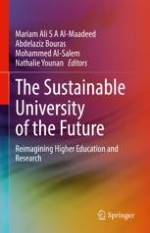2023 | OriginalPaper | Buchkapitel
Impact of the Industry 4.0 on Higher Education
verfasst von : Thafar Almela
Erschienen in: The Sustainable University of the Future
Aktivieren Sie unsere intelligente Suche, um passende Fachinhalte oder Patente zu finden.
Wählen Sie Textabschnitte aus um mit Künstlicher Intelligenz passenden Patente zu finden. powered by
Markieren Sie Textabschnitte, um KI-gestützt weitere passende Inhalte zu finden. powered by
